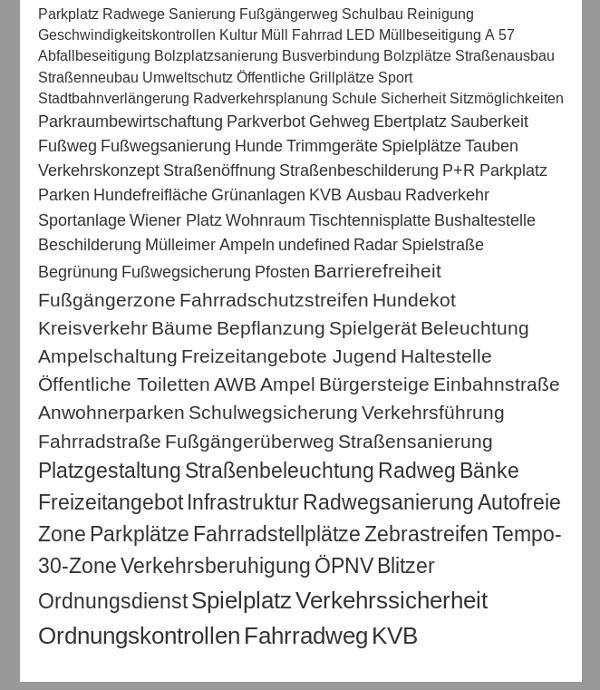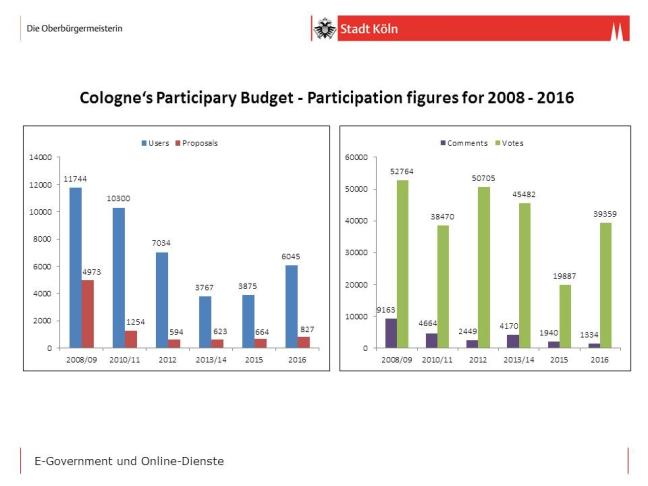Cologne's Participatory Budget (Bürgerhaushalt) initiative gives citizens a say in how a part of the municipal budget of the City of Cologne will be spent. Allowing citizens to participate in budget planning contributes to the design and development of the city, its districts and its community.
However, interest in the Participatory Budget declined from 2007 to 2015. In 2016, giving each of the nine city districts an extra 100,000 Euro for local spending has revitalised the process.

Participatory Budget 2016
Last month, the City completed the consultation phase for its Participatory Budget 2016 project, an annual initiative where citizens can submit ideas for their districts through an online dialogue. That way, citizens have a say in where the City will save or spend money.
This year, each district has been assigned 100,000 Euro to implement the proposals of its residents. This approach allows citizens to focus on problems and issues specific to their own districts, in addition to those that are relevant to all districts or the whole city.
This year, 854 proposals, 1,334 comments and 39,359 evaluations from 6,058 participants were received in the one-month period from 24 October to 27 November. This is an increase of about 30 percent compared to last year.
Outcomes
The outcomes — 25 proposals for each district, and 25 overall proposals — are now being evaluated by the City's specialists for their feasibility and financial implications. Subsequently, the specialists' evaluations and opinions will be sent to the respective districts' representatives. In the end, the financial committee of the City and the City Council of Cologne will decide which proposals will be implemented. The result of this process will be published on the Participatory Budget portal.
In the meantime, visitors to the site can view a simple word cloud to gain an impression of the topics that have been most discussed over the last month.

Participatory Budget 2015
The portal also shows the current state of affairs with regard to last year's Participatory Budget. The portal allows detailed searches based on topic, district and status, in addition to keywords and proposal numbers. The result is a description of the proposal, a list of comments, and the current status.

Policy Context
According to project lead Jürgen Behrendt, the history of the Participatory Budget goes back fifteen years. From 2001 to 2003, a civil society discussion took place within the local Cologne Agenda process. Cologne Agenda is a non-profit organisation that aims to promote dialogue, participation and sustainability by organising civil society actors in Cologne, and so influence decisions and events in local government and the municipal administration. The organisation had the idea to set up a participatory budget like the ones in Porto Alegre, Brazil [1, 2], and Christchurch, New Zealand.
This call was picked up by the leadership in Cologne's government, which then organised an expert symposium with participants from government, politics, municipalities that already had experience in participatory budgeting, the State Ministry of North Rhine-Westfalia, and the Deutscher Städtetag [DST; the Association of German Cities]. The symposium was such a success that the Council of Cologne asked the Cologne government for an implementation plan. When this was delivered, the Council decided to begin participatory budgeting based on the plan.
Description of target users and groups
Before people could actively join the discussions in the Participatory Budget forum, they had to register on the portal using a valid e-mail address. Participants were allowed to use an alias, so they could hide their real names from visitors and other participants. Non-registered visitors could make suggestions, but were not allowed to submit comments and evaluations.
Participation in the consultation was not limited to citizens of Cologne or people having an interest in the city's affairs. In principle, anyone was allowed to register and contribute. Previous experience, however, has shown that all participants have connections to the city somehow.
All suggestions and comments are publicly available through the portal, so anybody having an interest in the city's affairs has been able to follow the process.
Accessibility
To make sure everybody was able to participate, input could also be provided by phone or in writing. For participation by phone, a service number was provided by the municipal call centre,
Behrendt explains. The incoming contributions were submitted directly to the online platform by the call centre agents.
For written proposals and votes, forms were provided. These could be sent by traditional mail to the City of Cologne or be dropped off at the District's customer centre. These contributions were placed online by the municipal editorial staff.
In our opinion, providing access by phone as well as in writing is essential, so that we can reach citizens who lack an internet connection.
In 2016, 827 proposals were submitted, of which 10 were in written form and 6 by phone. From the 39,359 evaluations, 2,885 were submitted on paper.
Moderation
All input was moderated before publication by an external service provider. Their consultants made sure that all the submitted suggestions and comments obeyed the "rules of the game", and were formulated in such a way that other participants, other people and social groups were not attacked or defamed. The moderators focused was on the "how" — the tone of the discussions — to facilitate a constructive atmosphere for the dialogue.
Substantive considerations, like the professional and legal feasibility of proposals — the "what" — were not part of the moderation. These aspects are addressed by the specialists during the evaluation phase.
Participatory process
The process was explicitly set up this way — making an external, independent party responsible for the participatory process — to make sure that all contributions were treated equally.
According to Behrendt, the interventions required from the moderators — warnings and blocking of contributions or authors — were limited. About 5-8 percent of the contributions had to be moderated. Of course, the moderators had to read each and every proposal and comment to check it for a breach of the rules.
Other duties of this service provider were:
- supervising praise and criticism placed on the forum;
- forwarding contributions to the right staff member within the City, for example when a question had been asked or a breach of rules had to be reported;
- making a first check that each contribition had been placed in the correct city district;
- providing user support in case of problems, for example with the registration process;
- analysing the socio-economic data provided voluntarily by users;
- producing a final report on the participatory dialogue, e.g. numbers, datasets and facts; and
- writing tweets for the Twitter account.
Description of the way to implement the initiative
The concept of the Participatory Budget was changed in 2016,
Behrendt explains. For the first time, each of the nine city districts' budgets was assigned an additional 100,000 Euro. That way, the top-ranked proposals have better chances of realisation, making the Participatory Budget process more attractive. Focusing on the city districts better relates the Participatory Budget to the real lives of the citizens.
In 2007, the City of Cologne started full of hope with the first Participatory Budget as a pilot for e-participation. Up to now, six Participatory Budget projects have been organised. Looking back we can see the following trends:
- From the first to the fifth Participatory Budget, involvement decreased: from 11,000 participants down to 3,500, and from 5,000 proposals down to 650.
- The socio-demographic profile of the participants matches that of traditional participation projects, but more citizens have been reached online.
- The ongoing budgetary crisis meant that the Participatory Budget lacked relevance to local politicians. They did work out the proposals, but they never decided on their implementation.
- Using the new idea of district budgets we have managed to break this trend, and involvement has increased significantly.

Technology solution
The Participatory Budget platform is built on Drupal, the very same open source content management framework that is used for the Joinup platform.
Technology choice: Mainly (or only) open standardsMain results, benefits and impacts
The citizens of Cologne have been able to participate this way since 2007. Since then the project has won several awards: the United Nations Public Sector Award (2008), the European Public Sector Award (2009) [1, 2], and the audience prize in the 2008 E-Government Competition for Germany's Federal, State and Local Governments.
A scientific evaluation of the Participatory Budget of 2010 has been made by the University of Bielefeld.
Return on investment
According to Behrendt, the initial 2007 pilot required a large investment in development. The total amount spent on advice, building the platform, and four weeks of moderation was about 200,000 Euro. For successive Participatory Budgets, online moderation has cost 15,000-20,000 Euro, the exact amount depending on the duration of the process. Another 15,000 Euro should be reserved for adjustments to the platform itself. Public relations and advertising costs are about 50,000 Euro.
Track record of sharing
Within Germany, the City of Cologne cooperates with the City of Gütersloh on the technical platform for the Participatory Budget, and with the cities of Bonn and Frankfurt am Main on conceptual exchanges.
Internationally, the City of Cologne worked with three other cities — Manchester (UK), Ghent (Belgium), and Bologna (Italy) — in the EU project SMARTiP (Smart Metropolitan Areas Realised Through Innovation & People) on the development of ICT solutions for digital administrations.
We would be pleased to provide knowledge and answer questions as part of an exchange of experience with other cities in Europe,
Behrendt says.
Lessons learnt
According to Behrendt, Cologne's total budget for 2016 is 4,237,699,534 Euro. The 900,000 Euro assigned directly to the districts through the Participatory Budget is only a very small part of that.
Whether this amount will increase in the future has to be decided by the local politicians after evaluating the new concept. The mid-term budgetary position of the City of Cologne, however, will remain critical, and we will be facing a consolidation of the budget over the next few years. With this in mind, an increase in the participatory budget at this point seems unrealistic.
Links:
- http://www.kommune2-0.de/images/downloads/k20/Behrendt_Buergerhaushalt_Kommune_2.0.pdf
- http://www.slideshare.net/DiBlau/cologne-eparticipation
- http://www.epsa-projects.eu/index.php?title=Cologne_participatory_budget
- http://www.internationalbudget.org/wp-content/uploads/Ruesch-Wagner-PB-in-Germany.pdf
- http://www.ifib.de/publikationsdateien/study_e-participation_engl.pdf
Thanks to Dirk Blauhut, head of the eGovernment and Online Services department at the City of Cologne.
Scope: Local (city or municipality)
